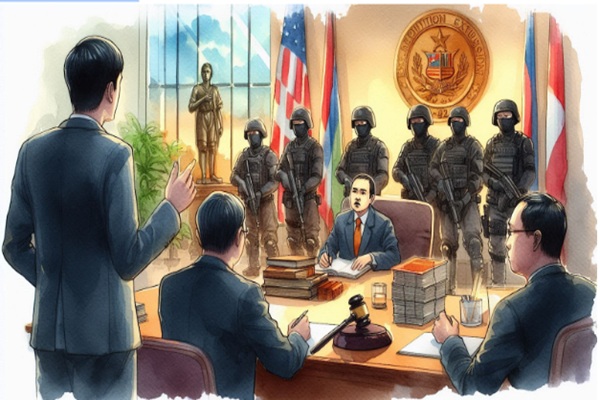U.S. Extradition and International Humanitarian Obligations

Balancing treaty commitments with global human rights standards and the evolving concept of safe harbor protection
WASHINGTON, DC, November 11, 2025
Extradition, once viewed as a procedural matter of bilateral cooperation, has evolved into a profound test of how nations reconcile justice with humanity. In the United States, the framework governing extradition is deeply intertwined with the country’s international humanitarian obligations. As global migration, political conflict, and human rights enforcement intensify in 2026, the U.S. faces growing scrutiny over how it balances treaty commitments with moral responsibility. The question is no longer merely whether a person can be extradited under law, but whether they should be, in light of humanitarian principles that transcend national boundaries.
The concept of extradition is rooted in reciprocity: the notion that states must cooperate to prevent fugitives from escaping justice by crossing borders. Yet, as human rights law has matured, so too has the understanding that certain extraditions may violate fundamental international norms. The challenge lies in harmonizing these obligations—ensuring that cooperation does not become complicity in persecution, torture, or arbitrary detention.
The Legal Architecture of U.S. Extradition
The American extradition system is anchored in a network of bilateral treaties complemented by statutory provisions under Title 18 of the U.S. Code (§§ 3181–3196). These treaties outline the procedural and evidentiary requirements for surrender while granting the executive branch discretionary authority over final approval. The Secretary of State ultimately decides whether to proceed with extradition after judicial certification, taking humanitarian, political, or diplomatic factors into account.
This dual structure reflects the constitutional balance between law and policy. The judiciary ensures that treaty conditions are met, while the executive considers broader ethical and diplomatic implications. This arrangement provides the flexibility needed to accommodate international humanitarian standards, but it also opens the door to political complexity.
The Rise of Humanitarian Considerations in Extradition
Humanitarian concerns have long influenced extradition decisions, though their prominence has increased dramatically in the post-Cold War and post 9/11 eras. The globalization of human rights norms has placed new moral and legal constraints on how governments treat individuals accused of crimes abroad.
The U.S. is bound by several international instruments that inform its approach, including the Convention Against Torture (CAT), the International Covenant on Civil and Political Rights (ICCPR), and customary principles of non-refoulement, which prohibit the return of individuals to countries where they face a substantial risk of torture or persecution. These obligations, while not always self-executing, shape the interpretation of extradition statutes and treaty provisions.
The Principle of Non-Refoulement
The doctrine of non-refoulement represents the cornerstone of humanitarian extradition law. It dictates that no person should be transferred to a state where they face serious harm or fundamental injustice. Incorporated into U.S. law through the Foreign Affairs Reform and Restructuring Act of 1998, this principle obliges the Secretary of State to deny extradition if credible evidence indicates a risk of torture or cruel treatment.
In Mironescu v. Costner (2009), the Fourth Circuit affirmed that CAT obligations apply to extradition, requiring the executive to assess the humanitarian implications of each case. Similarly, Trinidad y Garcia v. Thomas (2012) confirmed that courts may review whether the Secretary properly considered such risks, reinforcing judicial oversight as a safeguard against arbitrary surrender.
These precedents have transformed non-refoulement from a diplomatic courtesy into a binding legal responsibility. They also illustrate the ongoing convergence between domestic constitutional law and international humanitarian norms in American jurisprudence.
Case Study: Political Repression and the Limits of Reciprocity
In recent years, several high-profile cases have tested the boundaries of humanitarian protection within U.S. extradition law. One such example involves individuals sought by governments accused of authoritarian practices. Requests from nations such as China, Russia, and Turkey have raised serious concerns about fair trial guarantees and the potential for politically motivated prosecutions.
In In re Extradition of Sarmiento (2019), a Venezuelan businessman faced extradition on corruption charges. The U.S. court delayed certification, citing credible reports of judicial corruption and human rights abuses under the Maduro government. The Department of State later denied extradition, invoking humanitarian grounds. This case exemplifies the growing reliance on independent human rights assessments to determine whether treaty obligations can be ethically fulfilled.

Human Rights Treaties and Executive Discretion
The executive branch plays a pivotal role in reconciling treaty enforcement with humanitarian standards. The Secretary of State’s discretion serves as both a safeguard and a point of controversy. Advocates argue that executive authority allows flexibility in protecting individuals from harm, while critics warn that it risks inconsistency and political influence.
Diplomatic assurances are often used to bridge this gap. When extradition risks violating humanitarian principles, the requesting nation may provide formal guarantees of humane treatment and fair trial. However, the credibility of such assurances depends on the requesting country’s record and enforcement capacity.
In United States v. Kin-Hong (1997), the First Circuit emphasized that evaluating diplomatic assurances is the prerogative of the executive, not the judiciary. Still, courts have the power to intervene if assurances are manifestly unreliable or if their execution would result in a constitutional violation.
The Concept of Safe Harbor Protection
The principle of “safe harbor” has emerged as a moral and legal extension of humanitarian protection. It recognizes the duty of nations not only to refuse extradition in cases of potential persecution but also to provide refuge to individuals fleeing politically motivated or unjust prosecution. This concept draws from asylum and refugee law but increasingly informs extradition policy as well.
Safe harbor protection is particularly relevant in cases involving whistleblowers, dissidents, and human rights defenders. While the U.S. has historically granted asylum to individuals fleeing persecution, it has become more cautious in extending protection to those accused of criminal offenses, especially under espionage or cybersecurity statutes.
Legal scholars argue that safe harbor should be codified as an explicit consideration in extradition decisions, requiring systematic human rights evaluation rather than ad hoc judgment. Such reform would align U.S. practice with evolving international norms emphasizing transparency and accountability in extradition proceedings.
Case Study: The Digital Age and New Humanitarian Frontiers
The digital era has introduced novel forms of political repression and transnational surveillance, complicating the humanitarian calculus in extradition. Governments increasingly seek the surrender of journalists, activists, and data leakers under the guise of national security offenses. These cases challenge traditional distinctions between criminal and political conduct.
The extradition proceedings involving Julian Assange epitomize these tensions. While U.S. prosecutors assert that Assange’s actions violated national security laws, his defenders argue that extradition would endanger press freedom and subject him to inhumane prison conditions. The case has drawn international attention to the human rights dimension of digital-era extradition and to states’ responsibilities to protect individuals engaged in information transparency.
Similarly, cases involving Chinese and Russian dissidents highlight how digital surveillance and cyber laws are being weaponized against political opponents. Extradition to countries with systemic human rights abuses risks legitimizing such practices, undermining the universal principles the U.S. purports to defend.
Humanitarian Oversight and International Cooperation
Efforts to integrate human rights oversight into extradition procedures have gained momentum globally. The United Nations Human Rights Council and the Council of Europe advocate for the consistent application of humanitarian exceptions. The European Court of Human Rights has set precedents limiting extradition to countries where there is a risk of torture or unfair trial, influencing U.S. interpretations of its own obligations under CAT and customary international law.
Multilateral instruments, such as the United Nations Convention Against Transnational Organized Crime (UNTOC), now require extradition to be conducted in accordance with international human rights standards. The U.S., while not bound by regional courts, often aligns its policy with these norms to maintain credibility and reciprocity in treaty enforcement.
Private Sector and Humanitarian Responsibility
In the age of global data governance, private corporations also play a role in humanitarian extradition processes. Technology companies that host digital evidence or personal data are often subject to foreign subpoenas and warrants tied to extradition cases. Their compliance decisions can directly affect the fate of individuals facing transfer.
Companies like Microsoft and Google have developed human rights review procedures to evaluate government requests, ensuring that data disclosures do not contribute to human rights violations. This growing corporate responsibility reflects a broader shift toward shared accountability in safeguarding individuals against the misuse of legal mechanisms for political repression.
The Path Forward: Integrating Law and Humanity
As the global legal order evolves, the United States faces pressure to institutionalize humanitarian review within its extradition framework. Legal experts and human rights organizations propose reforms to require transparent reporting on how the Department of State evaluates risk, codify the role of independent human rights experts, and enhance judicial review of executive decisions.
Future extradition treaties are also expected to include explicit clauses referencing the Convention Against Torture, the ICCPR, and the principle of non-refoulement. These additions would not only standardize humanitarian protections but also strengthen the legitimacy of U.S. extradition policy in an increasingly rights-conscious world.
The humanitarian dimension of extradition reminds policymakers that justice cannot be achieved solely through legality. Every extradition decision carries moral weight, defining how nations interpret their obligations to one another and to the individuals whose lives hang in the balance. The United States’ continued leadership in global extradition depends not only on the strength of its treaties but on its commitment to upholding the principles of fairness, dignity, and human protection that underpin them.
Contact Information
Phone: +1 (604) 200-5402
Signal: 604-353-4942
Telegram: 604-353-4942
Email: info@amicusint.ca
Website: www.amicusint.ca
Anyone can join.
Anyone can contribute.
Anyone can become informed about their world.
"United We Stand" Click Here To Create Your Personal Citizen Journalist Account Today, Be Sure To Invite Your Friends.
Before It’s News® is a community of individuals who report on what’s going on around them, from all around the world. Anyone can join. Anyone can contribute. Anyone can become informed about their world. "United We Stand" Click Here To Create Your Personal Citizen Journalist Account Today, Be Sure To Invite Your Friends.
LION'S MANE PRODUCT
Try Our Lion’s Mane WHOLE MIND Nootropic Blend 60 Capsules
Mushrooms are having a moment. One fabulous fungus in particular, lion’s mane, may help improve memory, depression and anxiety symptoms. They are also an excellent source of nutrients that show promise as a therapy for dementia, and other neurodegenerative diseases. If you’re living with anxiety or depression, you may be curious about all the therapy options out there — including the natural ones.Our Lion’s Mane WHOLE MIND Nootropic Blend has been formulated to utilize the potency of Lion’s mane but also include the benefits of four other Highly Beneficial Mushrooms. Synergistically, they work together to Build your health through improving cognitive function and immunity regardless of your age. Our Nootropic not only improves your Cognitive Function and Activates your Immune System, but it benefits growth of Essential Gut Flora, further enhancing your Vitality.
Our Formula includes: Lion’s Mane Mushrooms which Increase Brain Power through nerve growth, lessen anxiety, reduce depression, and improve concentration. Its an excellent adaptogen, promotes sleep and improves immunity. Shiitake Mushrooms which Fight cancer cells and infectious disease, boost the immune system, promotes brain function, and serves as a source of B vitamins. Maitake Mushrooms which regulate blood sugar levels of diabetics, reduce hypertension and boosts the immune system. Reishi Mushrooms which Fight inflammation, liver disease, fatigue, tumor growth and cancer. They Improve skin disorders and soothes digestive problems, stomach ulcers and leaky gut syndrome. Chaga Mushrooms which have anti-aging effects, boost immune function, improve stamina and athletic performance, even act as a natural aphrodisiac, fighting diabetes and improving liver function. Try Our Lion’s Mane WHOLE MIND Nootropic Blend 60 Capsules Today. Be 100% Satisfied or Receive a Full Money Back Guarantee. Order Yours Today by Following This Link.






